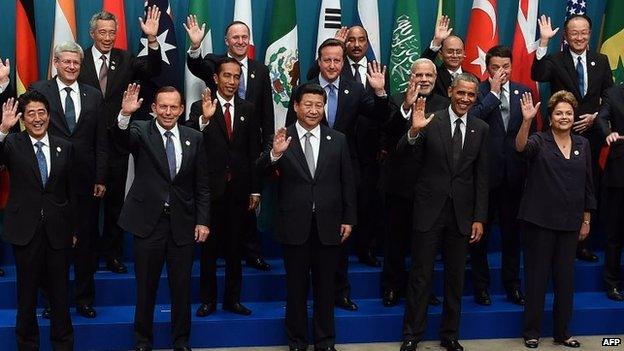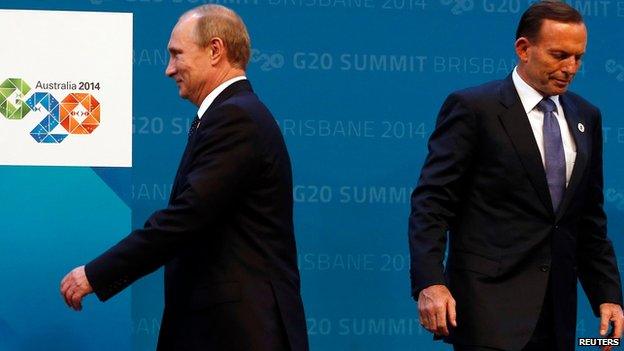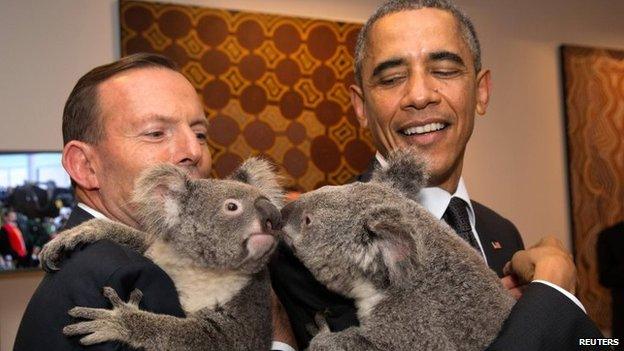G20 summit: Koalas and 'shirtfronting'
- Published

The G20 leaders are on their way home having pledged to boost global growth
It reportedly cost more than A$500m ($437m; £279m) for Australia to put on, but in just two days, the G20 summit has come and gone. The world's powerbrokers are making their way home.
But aside from a few healthy air-mile accounts and an unhealthy dose of jetlag, what have they got to show for it?
This summit was primarily meant to be about economics.
As predicted, and indeed recommended many months ago, the headline in the G20 final statement issued on Sunday was a pledge to increase global growth by just over 2% over the next four years.
This will apparently pump around $2 trillion into the global economy.
But for many people watching and listening around the world those figures are pretty hard to relate to.
It is easy for summits like G20 to be perceived as little more than expensive talking shops.
"They come here, sit in our air-conditioned hotels, drink our chardonnay and talk bullshit," Mal, a plain-speaking Queenslander, said to me on the sidelines of the G20 this weekend.
But the less cynical would point to fact that it is not often that 20 of the world's most powerful people actually get to meet to face to face. There must be some benefit in that.
Fighting talk

Despite Prime Minister Abbott's threats, President Putin went unscathed
And indeed at this year's summit there were plenty of woes to talk about - the threat from Islamic State and the turmoil in the Middle East, the Ebola crisis as well as the tensions between Russia and Ukraine.
In the end, it was the last of these issues that dominated the headlines coming out of Brisbane this weekend.
Vladimir Putin cut something of an isolated figure, as world leader after world leader set about verbally assailing the Russian president.
The Australian Prime Minister Tony Abbott had set the tone early when, last month, he offered the prospect of an actual physical confrontation with the black belt wearing Mr Putin who he promised to "shirtfront".
This is an expression originating from Australian football, which means charging an opponent forcefully in the chest.
In the end, Mr Abbott proved a little milder when confronted with Mr Putin face to face, opting instead for a firm handshake and a somewhat forced smile.
The "Putin-versus-the-world" story was the one that dominated this year's G20. Reporters wrote far more words on this than any other angle.
Reading and watching the news in Australia or Britain it is easy to see Mr Putin portrayed as the villain, bullying little Ukraine
But it is easy to forget that at home the image of the Russian leader standing up to an alliance of world powers probably plays rather well.
And certainly President Putin gave no sign that he is ready to make the change of direction that many of the G20 leaders are demanding of him.
Furry friends

The G20 leaders cuddled up to koalas, creating the summit's most memorable images
The one surprise of this year's G20 was a pledge to do more to address climate change which ended up on the final communique, somewhat embarrassingly for the hosts Australia, a country often criticised for its environmental policies, which had resisted calls to put the issue on the official summit agenda.
But the move came after President Obama's surprise announcement at last week's Apec meeting that the US and China had reached an agreement to reduce their respective emissions.
There was more pressure when Mr Obama then made climate change a key theme of his speech to a receptive audience of students at the University of Queensland on Saturday.
So in the end the G20 had plenty of talking points, at least for the journalists here.
But summits are not really events that capture the public imagination.
And it's probably fair to say that if you asked most people the one image they remember from this weekend in Brisbane it would be that of various suited and booted global bigwigs cuddling koalas.
If nothing else G20 2014 will go down as the summit where "koala diplomacy" was born.